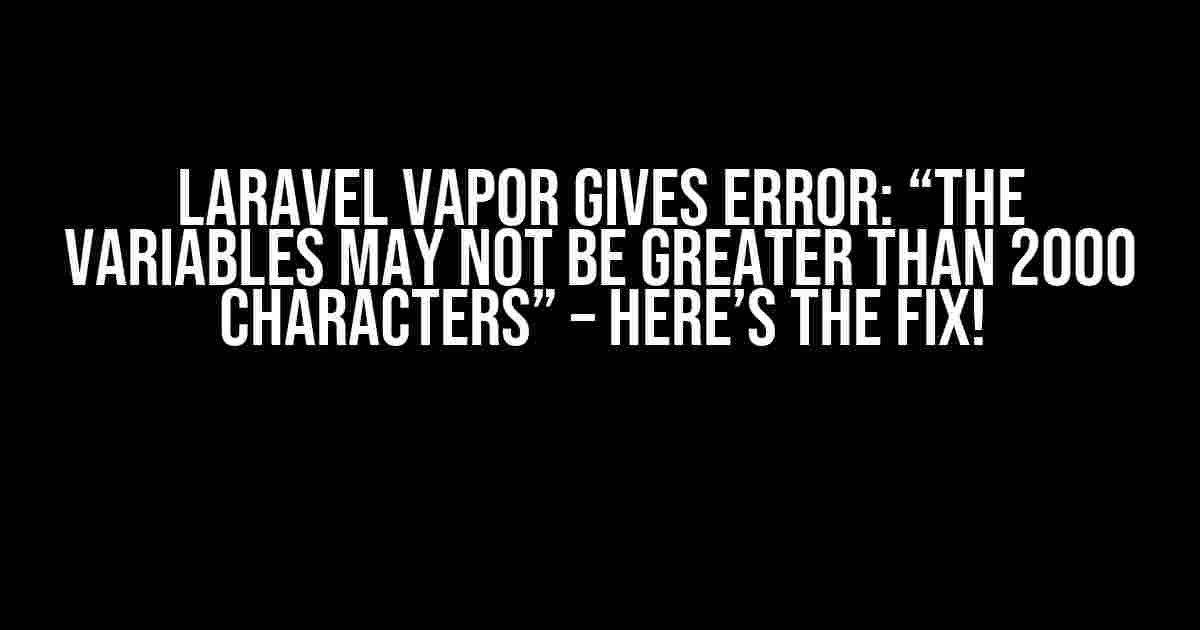Are you tired of encountering the frustrating error “The variables may not be greater than 2000 characters” while working with Laravel Vapor? Well, you’re not alone! This error can be a significant roadblock in your development process, but fear not, dear developer, for we’ve got the solution right here.
What Causes the Error?
The error “The variables may not be greater than 2000 characters” typically occurs when you’re trying to deploy your Laravel application to Vapor, and you’ve exceeded the character limit for environment variables.
By default, Vapor has a character limit of 2000 characters for environment variables, which can be a significant constraint, especially if you’re working with complex applications that require a large number of environment variables.
Why Do I Need to Fix This Error?
If you don’t address this error, you might encounter issues with your application’s deployment, and it may not function as intended. Moreover, ignoring this error can lead to security vulnerabilities and performance issues down the line.
So, let’s dive into the solutions to fix this error and get your Laravel application up and running on Vapor in no time!
Solution 1: Reduce Environment Variable Size
The most straightforward solution is to reduce the size of your environment variables. Here are a few strategies to help you do so:
-
Minify your environment variables: Remove any unnecessary characters, and compress your environment variables to reduce their size.
-
Split long environment variables: Break down long environment variables into smaller chunks, making sure each chunk is under the 2000 character limit.
-
Use Vapor’s built-in features: Leverage Vapor’s built-in features, such as encrypted environment variables, to reduce the size of your environment variables.
Example: Minifying Environment Variables
Before:
VARIABLE_1="this is a very long environment variable that exceeds the character limit"
After:
VARIABLE_1=$(echo "this is a very long environment variable that exceeds the character limit" | gzip -c | base64 -w 0)
In this example, we’re using gzip to compress the environment variable and then encoding it using base64 to reduce its size.
Solution 2: Use Vapor’s Environment Variable Files
Vapor provides a feature to store environment variables in separate files, which can help you bypass the character limit restriction.
Here’s how to use environment variable files:
-
Create a new file in your project’s root directory, e.g., `environment_variables.txt`.
-
Add your environment variables to the file, one variable per line, in the format `VARIABLE_NAME=variable_value`.
-
In your `vapor.yml` file, add the following configuration:
environment_variables: file: environment_variables.txt
By using environment variable files, you can store a large number of environment variables without worrying about the character limit.
Solution 3: Use a Third-Party Solution
If you’re working with a large number of environment variables, you might want to consider using a third-party solution that can help you manage your environment variables more efficiently.
One popular option is to use a secrets management tool like HashiCorp’s Vault or AWS Secrets Manager. These tools provide a secure way to store and manage sensitive data, including environment variables.
By using a secrets management tool, you can store your environment variables in a secure and scalable way, eliminating the need to worry about character limits.
Conclusion
The error “The variables may not be greater than 2000 characters” can be a frustrating roadblock in your Laravel development process, but with the solutions outlined above, you should be able to overcome this issue and deploy your application to Vapor with ease.
Remember to always prioritize security and efficiency when managing your environment variables, and don’t hesitate to explore third-party solutions if needed.
| Solution | Description |
|---|---|
| Reduce Environment Variable Size | Minify, split, or use Vapor’s built-in features to reduce environment variable size |
| Use Vapor’s Environment Variable Files | Store environment variables in a separate file to bypass character limit restriction |
| Use a Third-Party Solution | Utilize a secrets management tool to securely store and manage environment variables |
By following these solutions, you’ll be well on your way to resolving the “The variables may not be greater than 2000 characters” error and deploying your Laravel application to Vapor with confidence.
Frequently Asked Question
If you’re experiencing errors with Laravel Vapor, don’t worry, you’re not alone! Here are some frequently asked questions and answers to help you troubleshoot and overcome the hurdle.
What does the “The variables may not be greater than 2000 characters” error mean in Laravel Vapor?
This error occurs when you’re trying to deploy your Laravel application to Vapor, and the environment variables exceed the 2000 character limit. Yeah, it’s a mouthful! Simply put, Vapor has a restriction on the length of environment variables, and you’ve hit the ceiling.
Why do I get this error even though my environment variables are short?
It’s possible that your environment variables are being duplicated or concatenated, causing them to exceed the 2000 character limit. Check your Vapor configuration files and environment variables for any duplicates or unnecessary concatenations.
How can I reduce the length of my environment variables in Laravel Vapor?
You can reduce the length of your environment variables by splitting them into smaller chunks or using shorter variable names. You can also consider using a secrets manager like AWS Secrets Manager or Google Cloud Secret Manager to store sensitive information, rather than environment variables.
Is there a way to increase the 2000 character limit in Laravel Vapor?
Unfortunately, the 2000 character limit is a hard limit in Vapor, and it can’t be increased. However, you can use creative workarounds like storing sensitive information in a secrets manager or using shorter environment variable names to stay within the limit.
What are some best practices to avoid hitting the 2000 character limit in Laravel Vapor?
To avoid hitting the 2000 character limit, use short and descriptive environment variable names, avoid duplicating sensitive information, and use secrets managers for storing sensitive data. Additionally, consider using Vapor’s built-in features like encrypted environment variables and secret storage to keep your application secure and within the character limit.
